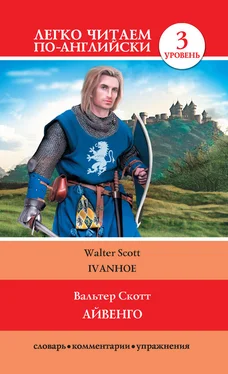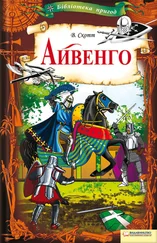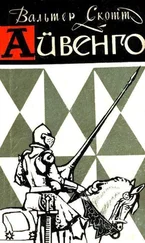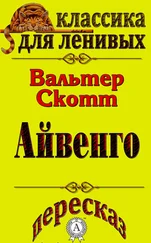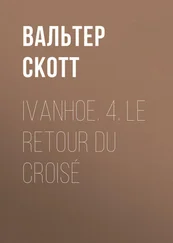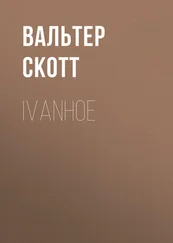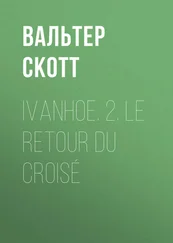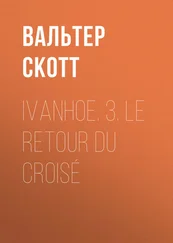“But, my daughter,” said Isaac, “we cannot be so unthankful.”
“We are the most thankful people on Earth,” said Rebecca—“we will thank him—but not now—for the sake of your beloved Rachel, father, not now!”
“It was well that the King,” said Ivanhoe to the Earl of Essex, “took you with him, noble Earl, and so many of your followers.”
The Earl smiled and shook his head.
“Brave Ivanhoe,” said Essex, “you know our King so well, and yet suspect him of taking so wise a precaution! I was on my way to York, when I met King Richard, like a true travelling knight galloping here. I accompanied him almost against his will.”
The rebellion ended before it started. Maurice de Bracy went to France, Philip de Malvoisin and his brother Albert were executed, Waldemar Fitzurse escaped to his castle, and Prince John was forgiven by his generous brother.
The wedding of Wilfred of Ivanhoe and Rowena was celebrated in the beautiful York Cathedral. The King himself attended, and both Gurth and Wamba were there. On the second morning after the wedding, Rowena was told that a maiden wanted to speak with her alone. A beautiful woman covered with a veil entered and bowed to the ground.
“What does this mean, lady?” said the surprised bride.
“To you, Lady of Ivanhoe,” said Rebecca, rising up, “I can lawfully pay the debt of gratitude which I owe to Wilfred of Ivanhoe. I am the unhappy Jewish woman, for whom your husband fought near Templestowe.”
“Lady,” said Rowena, “Wilfred of Ivanhoe on that day only repaid in part your charity towards him. Tell me, can I do anything for you?”
“Nothing,” said Rebecca, calmly, “unless you will give him my grateful farewell. We are leaving England. But before I go I want to ask you one thing. Your veil covers your features, please raise it and let me see your beautiful face.”
“It is not so beautiful,” said Rowena, “but I will do it, if you do the same.”
They both showed their faces and both blushed.
“Lady,” said Rebecca, “I will remember your face. Farewell.”
Wilfred of Ivanhoe and Rowena lived happily to the end of their days. They were attached to each other since childhood and all the obstacles they met on the way to their union only made their love stronger.
I. Answer the questions about the text:
Who was Cedric for Wamba and Gurth?
Who was Cedric for Rowena?
What was the name of the Palmer?
Why was Gurth so polite with the Palmer?
How did Isaac the Jew thank the Palmer?
How did Wamba save the situation at Ashby?
Why was Prince John angry with Locksley?
Why did Ivanhoe have the word ‘Disinherited’ on his shield?
Why did the robbers let Gurth go with his money?
Why did the spectators call the Black Knight a lazy knight?
What was the other name of Locksley?
Why did De Bracy attack and capture Cedric and Rowena?
How was Front-de-Boeuf wounded?
Who was Ulrica?
Why did the castle burn?
How did Front-de-Boeuf die?
Why were Richard and Wamba attacked in the forest?
Why did Athelstane not die?
Why did the Grand Master think that Rebecca was a witch?
How was it proved that Rebecca was not a witch?
II. Put the events in the correct chronological order:
The trial at Templestowe.
The storm of the Front-de-Boeuf’s castle.
Gurth’s night adventures.
The general combat on the first day of tournament.
Ulrica’s confession.
Robin Hood invites King Richard to a feast in the forest.
De Bracy’s conversation with Rowena.
Ivanhoe’s victory over Bois-Guilbert at Ashby.
Bois-Guilbert and Abbat Aymer come to Cedric’s mansion.
III. Decide, whether these sentences are true or false:
Wamba was a slave of Cedric.
Gurth was a jester.
De Bracy was a Templar.
Bois-Guilbert was the Grand Master of his Order.
Wilfred of Ivanhoe was Cedric’s son.
Rowena was Cedric’s daughter.
Front-de-Boeuf killed his father.
Wilfred of Ivanhoe was banished from his father’s house because he was a friend and servant of King Richard.
Rebecca was a good doctor.
Gurth brought to his master more money than Ivanhoe gave him.
Ivanhoe killed Bois-Guilbert.
Richard put his brother John in prison.
IV. Match each character with a correct description:

Abbey– n аббатство
accused– n обвиняемый
accustomed– adj привыкший
aim– v целиться
ale– n эль ( разновидность пива )
ancestor– n предок
archer– n лучник
armour– n доспех
ascetic– n аскет
astonishment– n изумление
axe– n топор, секира
banish– v изгнать
barbican– n барбакан ( внешнее укрепление, расположенное за крепостным рвом и защищающее ворота )
bend– v сгибать
beware– v беречься, бояться
blessing– n благословение
blow– n удар
bow– v кланяться
brass– n бронза
chain– v приковать
challenge– n вызов
champion– n рыцарь, участвующий в поединке или турнире
cloak– n плащ
confession– n исповедь
courage– n храбрость, мужество
courtesy– n благородство, учтивость
courtyard– n двор
crossbow– n арбалет
cure– v исцелить, вылечить
delusion– n обман, галлюцинация
descent– n происхождение
despise– v презирать
dignity– n достоинство
disinherit– v лишить наследства
distress– n горе, беда
doubtless– adv несомненно
drawbridge– n подъемный мост
duty– n долг
dungeon– n подземелье
enable– v давать возможность
entrance– n вход
exclaim– v восклицать
Читать дальше
Конец ознакомительного отрывка
Купить книгу
